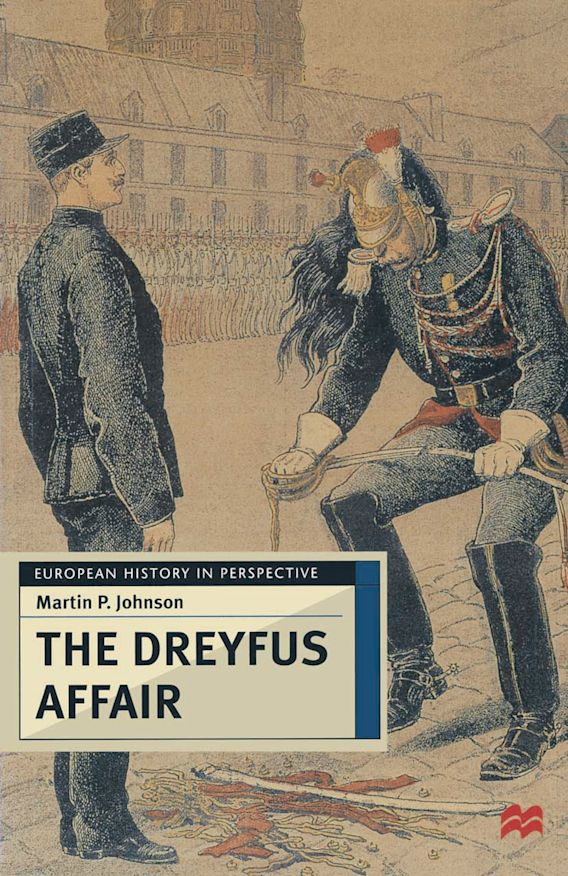Dreyfus Affair: 130 Years Later, A Call For Military Promotion

Table of Contents
The Dreyfus Affair: A Case Study in Systemic Antisemitism and Unjust Military Promotion
The Injustice of Alfred Dreyfus's Conviction
Alfred Dreyfus, a Jewish officer in the French army, was falsely accused of treason in 1894. His conviction, based on flimsy evidence and fueled by rampant antisemitism within the military establishment, was a gross miscarriage of justice. The trial was a sham, characterized by:
- Biased military intelligence: Evidence was manipulated and fabricated to fit a predetermined narrative of guilt.
- Lack of due process: Dreyfus was denied a fair hearing and basic legal rights.
- Influence of political agendas on promotions: The promotion of certain officers was prioritized over adherence to justice and fairness.
The Role of Military Hierarchy and Promotion Systems
The rigid and discriminatory promotion system within the French army played a significant role in exacerbating the injustice. The system was characterized by:
- Emphasis on social class and connections: Promotion often favored those from privileged backgrounds, regardless of merit.
- Lack of meritocracy: Competence and performance were secondary to social standing and personal connections.
- Secretive nature of promotion decisions: The lack of transparency allowed bias and favoritism to flourish unchecked.
The Long-Term Consequences
The Dreyfus Affair had profound and lasting consequences:
- Erosion of public trust: The scandal severely damaged the reputation of the French military and government.
- Rise of anti-Semitic sentiments: The affair fueled existing anti-Jewish prejudices and contributed to a climate of intolerance.
- Debates about justice and fairness within the military: The case sparked widespread public debate about the need for reform within the military justice system and promotion practices.
Modern Parallels and the Need for Transparency in Military Promotions
Systemic Bias in Contemporary Militaries
While the blatant antisemitism of the Dreyfus Affair may seem like a relic of the past, parallels exist in contemporary military systems. Issues of systemic bias persist, including:
- Implicit bias in selection processes: Unconscious biases can influence promotion decisions, disadvantaging qualified individuals from underrepresented groups.
- Underrepresentation of minorities: Many militaries still lack diversity at higher ranks, reflecting systemic barriers to advancement.
- Lack of diversity at higher ranks: This lack of representation impacts strategic decision-making and organizational culture.
The Importance of Meritocracy and Transparency
To prevent similar injustices, a fundamental shift towards meritocracy and transparency is essential. This requires:
- Establish clear guidelines: Define objective criteria for promotion based on skills, experience, and performance.
- Use standardized assessments: Implement fair and consistent evaluation methods to minimize bias.
- Implement independent oversight bodies: Establish external review mechanisms to ensure impartiality and accountability.
Fostering Inclusivity and Diversity
Creating a truly fair and representative military demands proactive measures to foster inclusivity and diversity:
- Affirmative action policies (where appropriate): Targeted policies can help address historical underrepresentation.
- Mentorship programs: Providing support and guidance to individuals from underrepresented groups.
- Diversity training for selection boards: Equipping selection panels with the tools to recognize and mitigate their own biases.
Specific Reforms for Military Promotion Systems
Implementing objective performance evaluations
Utilizing quantifiable metrics and 360-degree feedback mechanisms ensures a fairer assessment of an officer's capabilities, moving away from subjective opinions.
Establishing independent review boards
Independent review boards can provide impartial oversight of promotion decisions, ensuring fairness and reducing the potential for bias.
Increased transparency and accountability
Public access to promotion criteria and processes, coupled with clear appeals mechanisms, enhances accountability and reduces the risk of unfair practices.
Diversity and inclusion training for selection boards
Comprehensive training for selection board members can help mitigate implicit biases and promote equitable representation in promotions.
Conclusion: Learning from the Dreyfus Affair: A Call to Action for Military Promotion Reform
The Dreyfus Affair stands as a cautionary tale, highlighting the devastating consequences of biased and opaque military promotion systems. To prevent a recurrence of such injustices, we must prioritize transparency, meritocracy, and inclusivity in military promotion processes. Fair military promotions are not just a matter of justice; they are essential for building strong, effective, and representative militaries. Let us learn from its tragic lessons and demand meaningful military promotion reform today. Advocate for changes in your country's military promotion systems, pushing for fair military promotions and inclusive military leadership. The legacy of the Dreyfus Affair demands nothing less.

Featured Posts
-
 Atp Indian Wells Draper Wins First Masters 1000 Championship
May 24, 2025
Atp Indian Wells Draper Wins First Masters 1000 Championship
May 24, 2025 -
 M56 Collision Cheshire Deeside Border Delays
May 24, 2025
M56 Collision Cheshire Deeside Border Delays
May 24, 2025 -
 Schekotat Nervy Vzglyad Fedora Lavrova Na Pavlovskuyu Epokhu I Zhanr Trillera
May 24, 2025
Schekotat Nervy Vzglyad Fedora Lavrova Na Pavlovskuyu Epokhu I Zhanr Trillera
May 24, 2025 -
 Piazza Affari Oggi La Fed Detta L Agenda Focus Su Banche E Italgas
May 24, 2025
Piazza Affari Oggi La Fed Detta L Agenda Focus Su Banche E Italgas
May 24, 2025 -
 Escape To The Country Budget Friendly Dream Homes Under 1m
May 24, 2025
Escape To The Country Budget Friendly Dream Homes Under 1m
May 24, 2025
Latest Posts
-
 Sean Penn And Woody Allen Examining A Persistent Me Too Blind Spot
May 24, 2025
Sean Penn And Woody Allen Examining A Persistent Me Too Blind Spot
May 24, 2025 -
 Mia Farrow Michael Caine And A Surprising Set Visit During A Sex Scene Filming
May 24, 2025
Mia Farrow Michael Caine And A Surprising Set Visit During A Sex Scene Filming
May 24, 2025 -
 Michael Caine On Mia Farrow Sex Scene Bloody Hell
May 24, 2025
Michael Caine On Mia Farrow Sex Scene Bloody Hell
May 24, 2025 -
 Will Ronan Farrow Orchestrate Mia Farrows Return To The Spotlight
May 24, 2025
Will Ronan Farrow Orchestrate Mia Farrows Return To The Spotlight
May 24, 2025 -
 Mia Farrows Comeback Is Ronan Farrow The Key
May 24, 2025
Mia Farrows Comeback Is Ronan Farrow The Key
May 24, 2025
